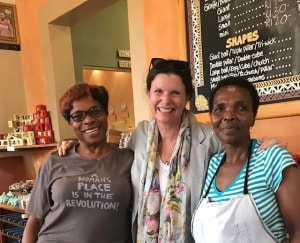An experience in Greece gave me a chance to test this writer’s theory.
Passing through the city of Thessaloniki, after a relaxing week on the island of Skopelos, I was on my way back to my work in Pristina, Kosovo. My travel connection to Pristina didn’t leave until the following morning so I spent the night. Being a waterfront lover, I found a nice, moderately priced hotel near the harbor area. After checking in and relaxing awhile I decided to take a walk around the city and have a light dinner.
It was a pleasant June evening and I enjoyed the walk. Thessaloniki has a large, broad bay that faces the Northern Aegean Sea. It boasts a bustling commercial harbor. I tramped up and down the waterfront gazing at the different types of ships that call on the city also known as Salonica. Ferries bound to and from the islands of the Aegean Sea scurryied in and out of their docks. I saw a troopship loading a German Army unit returning home after duty in Kosovo. A number of tramp freighters were in port waiting for new cargo. It proved to be the kind of place that intrigues me—lots of waterfront activity.
As darkness started settling in I began feeling hunger pangs and headed back to the neighborhood of my hotel. Near the hotel were a number of small restaurants patronized by the local residents. I decided to eat at a brightly decorated delicatessen.
The delicatessen had lighted, refrigerated showcases and from these I could choose the ingredients for my sandwich. Choosing was the hard part. They had artistically arranged a bountiful variety of foodstuffs in the cases. The problem was identifying the foods. Some were easily recognized; bologna, sausage, etc. Not being much of a red meat eater I wanted either chicken or turkey. But how would I communicate? I didn’t speak any Greek. And I didn’t recognize the chicken or turkey.
As I was mulling over my problem, a tall, bright–eyed, attractive young women asked if she could help me. At least I think that’s what she said. She had an obvious twinkle in her eye. My Irish forbears might affectionately say she had “a bit o’ the devil in her.” I looked at the showcase and pointed at some light meat. She told me what it was—in Greek. Puzzled, and showing it, I pointed again. The young woman stood back and thought over the situation. She then folded her arms under her shoulders and started flapping them like a bird. I started laughing. After a moment’s thought she decided she needed to expand her description. She puffed up her cheeks and then made gobbling noises like a turkey. Both of us started laughing. She had delightfully communicated her message. And I got my turkey sandwich.
The next morning I stopped in the delicatessen to see if my new friend was there. It was her day off. One of her colleagues spoke some English and I told her what had happened the previous evening. She started laughing and loudly told all of her co-workers about my experience. Everyone in the small restaurant, including the customers, joined in the gaiety. The young woman’s charm and spontaneity had delighted another audience—and made a traveler feel welcomed.
The well-known travel writer was right.




